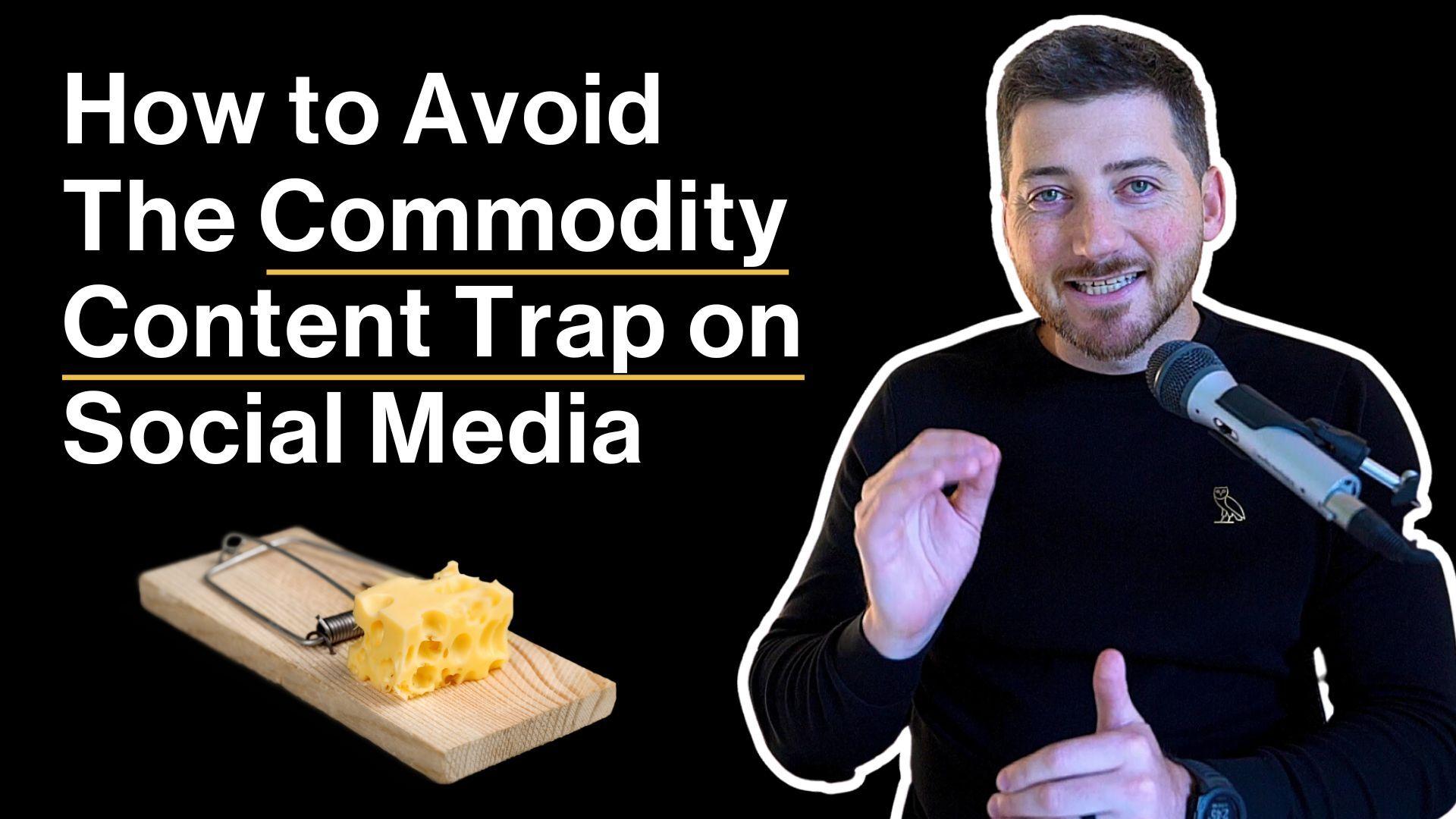
How Brands Can Avoid the Commodity Content Trap
Social media isn’t just about getting attention; it’s about being memorable.
The problem is that too many marketers over-index the importance of cheap attention in lieu of creating real connections with customers.
This is because they fall into the Commodity Content Trap–creating the same repackaged content as everyone else on the internet.
So, how do you avoid falling into the trap and keep your content relevant to your audience?
I’ll explain.
But first, What is Commodity Content?
This is content that’s widely shared and repeated with little to no original thought attached to it.
This can be either (i) sharing industry news or (ii) participating in trends.
Industry News
Although this might have worked for the nightly news in 1982, when distribution channels were limited to a few TV channels, consumers today have plenty of avenues to access information.
Why is it bad to repackage your industry news into content?
The answer is poor brand recall.
The end viewer typically doesn’t recall the brand that shares the news; they remember the news itself.
Herein lies the problem. If your company is creating content, it’s doing so with the goal that consumers (i) buy your product/service or (ii) have brand recall when considering buying your product/service. Being the megaphone for industry news doesn’t help you accomplish either.
Consumers don’t want you to report the news; they want your opinion and an explanation of how it affects them. When you focus on regurgitating the news without adding original opinion, you become what I call the Forgettable Messenger.
Trends
Trends themselves aren’t inherently bad. It’s when they detract from main content plans that they become an issue. Participating in Trends is fun but often not effective.
Why?
Three issues that arise with trends pop out to me. First, participating in a trend or parodying a pop-culture event can lead to engagement (good) but leave the audience remembering the trend or pop-culture moment over your brand (not good).
Next, which is something I spoke with Hubspot’s Senior Team Lead for Social, Chi Thukral, about is the need to move with haste if you want to participate in any trending content. The internet moves fast, and you don’t want your brand late to the party.
Third, chasing trends and news stories can detract your team from building original content if you have a thin social team. Chasing trends is a tall ask if you have a one or two-person social team. Every step toward a trend is ultimately a step you’re not taking toward original content.
All-in-all, commodity content tricks creators. It’s easy to conflate views, shares, and engagement with brand affinity and recall—but it’s not always the case.
So, how do you enhance recall and deepen connection with your audience?
1. Add Value
There’s no implicit issue with being a curator of content. However, it’s crucial you bolt your unique opinion on top of the content. People follow you/your company for your insights, not shallow observations. To make sure this doesn’t happen think about your content as an op-ed instead of news coverage.
Here is my basic formula for adding value:
Circulating content (industry news) + original opinion = value add
Someone who does a great job of this is Ali Kaltman. You can see an example post from her below.
2. Create interaction
Interactive content creates 52% more engagement than static content. By adding buttons, sliders, polls, questions, and quizzes to your social media, you are changing your content style from broadcast to conversational and increasing brand recall along the way. In a sea of sameness and infinite choice for the consumer, interaction is the epicenter of value creation and brand attachment.
3. Create Narratives
The key to great storytelling on social media is realizing your viewer is the hero. When looking at content through that lens you will quickly realize which content centers them and which centers you/someone else. Your job is to frame content so that (i) makes you the helpful guide and (ii) makes your customer the story’s focal point.
Stories entice viewers and create physiological responses in the brain. You, me, and everyone else uses them to teach, entertain or persuade people. Memorable brands are master storytellers and have perfected the art of building tension.
“In order to motivate a desire to help others, a story must first sustain attention – a scarce resource in the “rain – by developing tension during the narrative. If the story is able to create that tension then it is likely that attentive viewers/listeners will come to share the emotions of the characters in it, and after it ends, likely to continue mimicking the feelings and behaviors of those characters.” – Paul Zak, Professor of Economics, Psychology and Management at Claremont Graduate University in his HBR Article on storytelling
4. Ditch Influencers, Embrace Ambassadors
As mentioned in a previous article, consumers don’t trust influencers to the same degree today as they did ~five years ago. Instead of taking a shotgun approach to your influencer strategy, partner with creators who embody what your company is about.
Ridge just did this with MKBHD, bringing him on as a full-fledged partner in the business. Listen to their CEO, Sean talk about this on a recent podcast.
5. Be Cautious with AI
AI is a tool for content, not a replacement. As more marketers use the same AI tools, content will become hard to differentiate among brands. That’s why it’s so important to (i) create interaction and (ii) tell stories to stand out.
Be careful of falling into the Commodity Content Trap and remain steadfast in your original content production.
Other Resources for Brand Social Media
- How to Create a Social Media Plan
- 7 Most Common Mistakes Brands Make on Social (And How to Fix Them)
- How to Hire the Best Social Media Manager
Resources for Marketers
Learn More About Our Agency
















